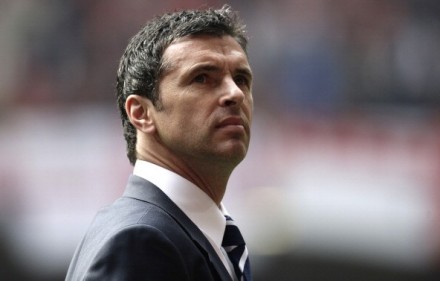|
It's
no different from any other "death knock", wizened hacks tell me.
Well,
I agree.
 |
|
A picture taken on March 26, 2011 shows manager of Wales
Gary Speed awaiting kick off against England during a Euro
2012 Group G qualifying football match at the Millenium
Stadium, Cardiff, Wales. Credit: Getty Images |
There they are, illustrating the stories about Gary Speed's death.
Photos of his house, after he died -- possibly with grieving relatives
still inside, looking out at the lenses trained on their windows. Some
are taken through trees, others from the front gate. It's not a
particularly lovely thing to see.
This is no different from any other "death knock", wizened hacks will
tell me with a shake of their jowls.
Well, I agree. And that's because during my brief and unsuccessful
journalism career, I never agreed with the idea of sending some
fresh-faced young hack down to try and negotiate a frontpage splash with
a grief-stricken family, all the time telling ourselves that it might be
doing some good. It might help the family, we lied to ourselves. It
might be therapeutic, or cathartic, we pretended.
Yes, perhaps there are some families whose moment of awfulness has been
eased somehow by chatting to a reporter over a cup of tea and handing
over treasured photos of the people they've just lost.
But it's never been about that: that's always been the fig leaf. It's
simply a means to flog some newspapers by exploiting vulnerable people's
misery. Deep down, we know that, and we always did know it.
"Please leave the family alone," says a commenter under the Daily Mail's
story about the former Leeds star and Wales football manager, who died
at the weekend. "That photo of the cameras camped outside his house
chills me. His poor family will be mobbed everywhere they go now. For
once do the decent thing and leave well alone."
It's probably a vain hope, but perhaps this kind of sentiment is going
to surface more and more in a post-phone hacking world, where we're
reassessing our relationship with the printed press and other media, and
asking whether such a level of intrusion is really justified. As I wrote
the other day, we as punters are in part responsible, by buying the
filth in the first place or contributing to a culture in which it's seen
as somehow justified.
But there's a sense in which the intrusions into the private lives of
the families of Milly Dowler, terrorist atrocity victims and the parents
of Madeleine McCann, among many others, marked a time when we couldn't
ignore how our news arrived anymore. We'd happily eaten the sausages
without wondering what had happened in the factory before they'd arrived
on our plate -- but now we were being shown the rather unsavoury truth.
You can try to make a case for some celebrities giving away a sliver of
privacy when they choose to live in the public eye, by taking up a
career as a marketable film star and so on. But there are other people,
ordinary people like you and me, whose lives have been wrecked through
no choice of their own, because they happened to be victims of an
unimaginably awful event or were related to someone famous who did. What
choice have they had? Why must they be pursued in the same way?
We can hope that Gary Speed's family are left alone to deal with this
terrible tragedy. But I fear they won't be. |


